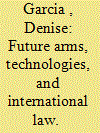| Srl | Item |
| 1 |
ID:
161429


|
|
|
|
|
| Summary/Abstract |
Some scholars suggest popular culture shapes public attitudes about foreign policy in ways that can affect real-world political outcomes, but relatively few studies test this proposition. We examine whether—and more importantly how—popular culture affects public opinion on foreign policy through a survey experiment on American attitudes toward fully autonomous weapons. We queried respondents about their consumption of popular culture—including a number of iconic science-fiction films featuring armed artificial intelligence (AI)—before or after questions about autonomous weapons. We find that science fiction “priming” exerts no independent effect on political attitudes, nor does referring to autonomous weapons as “killer robots.” However, consumption of frightening armed AI films is associated with greater opposition to autonomous weapons. This “sci-fi literacy” effect increases for the highest consumers of science fiction if they are “primed” about popular culture before reporting their attitudes—what we call the “sci-fi geek effect.” Our project advances current understanding of how popular culture affects public opinion on foreign policy and suggests avenues for further inquiry.
|
|
|
|
|
|
|
|
|
|
|
|
|
|
|
|
| 2 |
ID:
145680


|
|
|
|
|
| Summary/Abstract |
This article presents an initial discussion of the political and legal challenges associated with weaponised technologies in three interconnected areas that may impinge upon the ability to protect civilian populations during peace and war and imperil international security: armed unmanned combat aerial vehicles (commonly known as drones); autonomous weapons systems (known as ‘killer robots’); and the potential militarisation of cyberspace, or its use as a weapon, and the operation of drones and killer robots in the cyber domain. Supporting the argument that the world is ‘facing new methods of warfare’ and that international security governance and law are not keeping up, the article provides an overview and interpretation of three technologies in connection with aspects of five branches of law: state responsibility, use of force, international humanitarian law, human rights law, and law of the commons. I argue therefore that ‘preventive security governance’ could be a strategy to curtail uncertainty in the preservation of stability and international order. I define ‘preventive security governance’ as the codification of specific or new global norms, arising from existing international law that will clarify expectations and universally agreed behaviour on a given issue-area. This is essential for a peaceful future for humanity and for international order and stability.
|
|
|
|
|
|
|
|
|
|
|
|
|
|
|
|
| 3 |
ID:
148796


|
|
|
| 4 |
ID:
147859


|
|
|
|
|
| Publication |
New Delhi, Vij Books India Pvt Ltd, 2016.
|
| Description |
xi, 247p.hbk
|
| Standard Number |
9789385563614
|
|
|
|
|
|
|
|
|
|
|
|
Copies: C:1/I:0,R:0,Q:0
Circulation
| Accession# | Call# | Current Location | Status | Policy | Location |
| 058840 | 629.892/JHA 058840 | Main | On Shelf | General | |
|
|
|
|
| 5 |
ID:
177751


|
|
|
|
|
| Summary/Abstract |
Many see the advent of lethal autonomous weapon systems as the next revolution in military affairs. Currently, some 30 countries share the view that these weapons should be preemptively banned, but we know relatively little about their motivations. This study contributes to the growing literature on “killer robots” by theorizing preventive arms control as an anticipatory response to military innovation. I suggest that states prefer preventive arms control when they lack capacities or incentives to pursue innovation in the first place. I analyze a cross-sectional dataset on national positions toward the ban on autonomous weapons and demonstrate that the probability of support for preventive prohibition decreases with increasing financial and technological capacities. Both democracies and autocracies are less likely to support the ban than mixed regimes. Conversely, states with strong humanitarian orientation and high socialization within specific arms control regimes are more likely to support the ban.
|
|
|
|
|
|
|
|
|
|
|
|
|
|
|
|